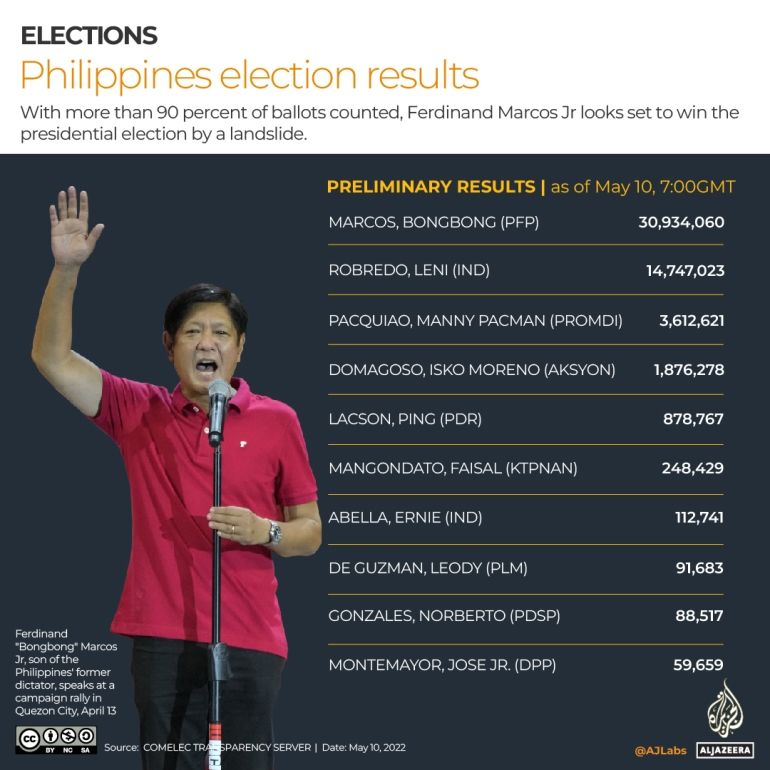Ferdinand Marcos, son of ex-dictator, takes unassailable lead over his rival Leni Robredo, unofficial count shows.
Ferdinand Marcos Jr, the son of former Philippines dictator Ferdinand Marcos, is on course to win a landslide presidential election victory, with 98 percent of eligible ballots counted, according to unofficial data from the poll body.
Ferdinand ‘Bongbong’ Marcos Jr had secured almost 30 million votes, more than double that of his nearest rival, liberal candidate Leni Robredo, the current vice president and a champion of human rights.
“There are thousands of you out there, volunteers, parallel groups, political leaders that have cast their lot with us because of our belief in our message of unity,” Marcos said in a statement streamed on Facebook, while standing beside the Philippine flag.
“Judge me not by my ancestors, but by my actions,” he added.

The victory spells an astonishing turnaround for the fortunes of the Marcos’ clan, who have gone from the presidential palace to pariahs and back again in the space of half a century.
In 1986, Marcos senior and first lady Imelda Marcos were forced into exile by the ‘People Power’ revolution. Derided as a dictator who had tortured, killed or disappeared thousands of critics after imposing martial law, and looting billions, Ferdinand Marcos died in Hawaii in 1989.
Despite the unanswered questions over Marcos Sr’s rule, a few years later the family returned to the Philippines to resume their role in politics, using their vast wealth and far-reaching connections to build support.
The vote was also a chance for Marcos to avenge his loss to Robredo in the 2016 vice presidential election, a narrow defeat by just 260,000 votes that he sought unsuccessfully to overturn. Robredo, a 57-year-old lawyer and economist, had campaigned on a promise to clean up the country’s politics, and tackle corruption.
As the vote count showed the extent of the Marcos win, Robredo told her supporters to continue their fight for truth until the next election.
“It took time to build the structures of lies. We have time and opportunity to fight and dismantle these,” she said.
Manila city Mayor Francisco Domagoso, running a distant fourth, became the first presidential contender to concede defeat.
Marcos has presented no real policy platform, but his presidency is expected to mirror outgoing leader Rodrigo Duterte, whose ‘strongman’ style proved popular even as thousands were killed in his signature ‘drug war’. Marcos’ running mate was Duterte’s daughter, Sara, in an alliance of some of the most powerful families in the Philippines. At the start of his term, Rodrigo Duterte had also allowed Marcos to be buried in Manila’s heroes cemetery.
“The victory of the son of a dictator and the daughter of a human rights abuser, both of whom have staunchly defended the legacy of their fathers, does not bode well for the restoration of rule of law and respect for human rights in the country,” said Charles Santiago, a Malaysian member of parliament and chair of ASEAN Parliamentarians for Human Rights.
Anti-Marcos protests
Meanwhile, around 400 people, mostly students, staged a protest against Marcos outside the election commission, citing election irregularities.
The poll body upheld its dismissals of complaints filed by different groups, including victims of martial law, that had sought to disbar Marcos from the presidential race based on a 1995 tax evasion conviction.
Two of the petitioners, including leftist group Akbayan, said they will appeal to the Supreme Court.
Marcos opponents have already pledged to pursue efforts to have him disqualified over a previous tax conviction and to extract billions of dollars in estate taxes from his family.
“It’s another crossroads for us,” Judy Taguiwalo, 72, an anti-Marcos activist who was arrested twice and tortured during the elder Marcos’s regime, told AFP news agency. “We need to continue to stand up and struggle,” she added.
Immense problems
More than 60,000 security personnel were deployed to protect polling stations and election workers. Police reported at least two deadly shootings at polling stations on the restive southern island of Mindanao that left at least three people dead and three wounded. That followed a grenade attack on Sunday that injured nine people.
The winner of Monday’s election will take office on June 30 for a single, six-year term.
The president-elect will inherit immense problems, including a pandemic-battered economy, deep poverty and the legacy of teh drug war, which is now the focus of an International Criminal Court investigation.
Amnesty International said Marcos Jr and Duterte’s avoidance of any discussion on human rights violations whether during Martial Law or the drug war was “concerning” and that if confirmed in the posts they should make amends.
“The new government should make a dramatic course correction,” Emerlynne Gil, Amnesty International’s Asia Pacific deputy regional director said in a statement. “The widespread arbitrary arrests and detentions, torture and extrajudicial killings that occurred in the martial law era and violations committed more recently during the Duterte administration must never be allowed to happen again.”
Aside from the presidency, more than 18,000 government posts were up for election, including half the 24-member Senate, more than 300 seats in the House of Representatives, as well as provincial and local offices across the archipelago.
About 67 million people registered to cast their ballot.















